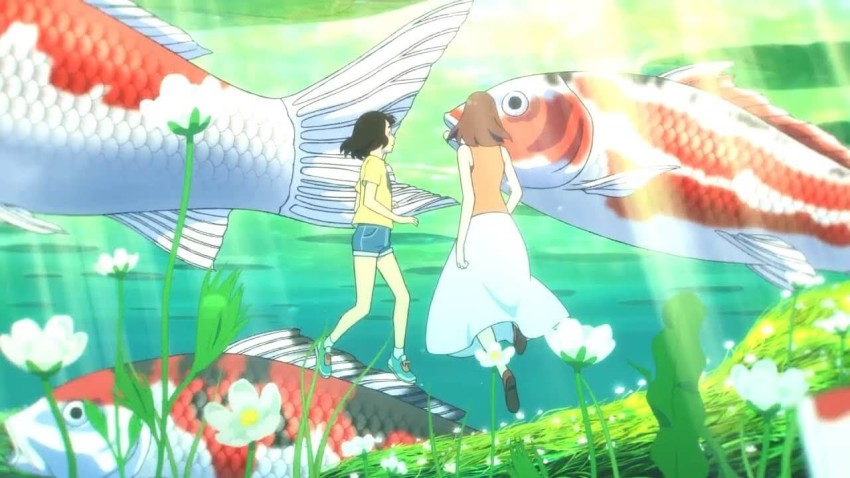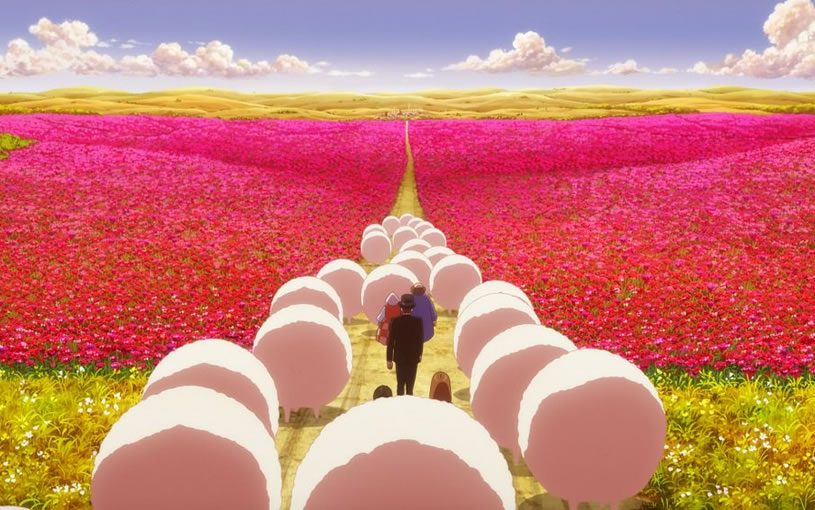Birthday Wonderland
September 21, 2019 · 0 comments
By Jonathan Clements.
 Listless and depressed, and desperate to avoid the latest trend-conscious schoolgirl drama at school, Akane (Mayu Matsuoka) feigns an illness, which her mother Midori (Kumiko Aso) seems ready to indulge – it is going to be her birthday soon after all. Instead, she sends the pouting teenager over to Aunt Chii’s junk shop to pick up her present, where Akane inadvertently summons the alchemist Hippocrates (Masachika Ichimura) through the portal that exists in Aunt Chii’s basement.
Listless and depressed, and desperate to avoid the latest trend-conscious schoolgirl drama at school, Akane (Mayu Matsuoka) feigns an illness, which her mother Midori (Kumiko Aso) seems ready to indulge – it is going to be her birthday soon after all. Instead, she sends the pouting teenager over to Aunt Chii’s junk shop to pick up her present, where Akane inadvertently summons the alchemist Hippocrates (Masachika Ichimura) through the portal that exists in Aunt Chii’s basement.
Hippocrates has come in search of the Green Goddess of the Wind, a legendary figure in his own world, who is needed to help his country face a crisis. Reluctantly conceding that she might be the one, Akane allows herself to be dragged along into an adventure that will include, in no particular order, giant carp, a granny who threatens to knit herself to death, stampeding sheep and a cat’s arse.
Hippocrates comes from a world where the industrial revolution has yet to take hold – a simple pastoral realm of sheep pastures and wool-flower fields, where the crown prince has gone missing, and where a marauding pair of thugs in a steampunk tank are trashing the countryside. Akane and Chii (the aunt having insisted on coming along) are plunged into a surreal road trip across wildly differing sceneries, finding out about the strange new world, and hoping to somehow help Hippocrates find the missing prince, whose presence is vital at an all-important rain-making ceremony.
For many viewers outside Japan, Birthday Wonderland will be their first introduction to the works of Sachiko Kashiwaba, an author who cites Mary Poppins and the Narnia books as her main influences. Kashiwaba trained as a pharmacist in north-east Japan before finding fame in the 1970s with her first novel, The Marvelous Village Veiled in Mist. Its protagonist was a girl strongly resisting the call to adventure, a timid, lost soul who eventually finds fulfilment through life and work in a strange European-style town that would sometimes materialise in the mists of an Iwate forest… but only for the right visitor. The story is famous, not only for its critical acclaim and awards nods, but because it was considered by Hayao Miyazaki as his next movie project in 1998. When Miyazaki put the idea aside and went on to make the thematically similar Spirited Away instead, Kashiwaba’s illustrator Kozaburo Takekawa publicly accused the Studio Ghibli director of plagiarism. But Miyazaki had openly acknowledged his debt to Kashiwaba’s book, and rather than rock the boat any further, the publishers at Kodansha fired Takekawa, replaced him with a new illustrator, and somewhat ungraciously, bragged ever-after in their book blurbs that The Marvelous Village Veiled in Mist had “inspired” Miyazaki’s Oscar-winning classic.
We might consider, then, the likely impact of this little spat on Kashiwaba’s subsequent fame – she was embroiled in a similar confusion, again through no fault of her own, when Genndy Tartakovsky’s Hotel Transylvania was released in Japan under the title Monster Hotel, which happened to be the name of an unrelated series she had been writing for a decade. That aside, as director Keiichi Hara became dragged into the inevitable “next Miyazaki” hype, alongside the likes of Makoto Shinkai and Mamoru Hosoda, it was only a matter of time before producers went back to the source… if Kashiwaba’s work had been enough to spark that Ghibli film that won the Oscar, maybe there were some other ideas lurking in her back catalogue?
 Indeed, there were. Not only were there fripperies like her alchemical anime Fun Fun Pharmacy, but deeper-seated children’s fantasies like Special Train to the Orchard (1989), in which the titular locomotive takes you where need to go, whether you realise it or not, or The What’s-Next Library (2010), where famous characters from children’s books break out of their papery prisons to find out what happened to the readers who loved them when they were young. And then there was A Mysterious Journey from the Cellar (1981), in which a contract dispute over a basement shared with an alternate dimension (no, really) leads a glum schoolgirl into a battle to save another world. It is this book, somewhat altered on several levels, not the least through a design overhaul by the Russian artist Ilya Kuvshinov, that formed the basis for Keiichi Hara’s film Birthday Wonderland (2019).
Indeed, there were. Not only were there fripperies like her alchemical anime Fun Fun Pharmacy, but deeper-seated children’s fantasies like Special Train to the Orchard (1989), in which the titular locomotive takes you where need to go, whether you realise it or not, or The What’s-Next Library (2010), where famous characters from children’s books break out of their papery prisons to find out what happened to the readers who loved them when they were young. And then there was A Mysterious Journey from the Cellar (1981), in which a contract dispute over a basement shared with an alternate dimension (no, really) leads a glum schoolgirl into a battle to save another world. It is this book, somewhat altered on several levels, not the least through a design overhaul by the Russian artist Ilya Kuvshinov, that formed the basis for Keiichi Hara’s film Birthday Wonderland (2019).
In the original book, Aunt Chii (Anne) is an obvious Mary-Sue for the author herself – her junk shop was even a pharmacy, to which the malingering Akane was sent for medicine, not a birthday present. A fun-loving free spirit, endlessly looking for adventure, with a go-bag ready by the door and multiple foreign destinations bookmarked on her laptop, Aunt Chii is a woman keen to embrace any quest, who invites herself along on Akane’s adventure because she just doesn’t believe her niece will properly appreciate it. Hara’s anime feature, from a script adaptation by his customary collaborator Miho Maruo, finds in Akane another dour, flawed protagonist like those in his earlier Miss Hokusai and Colorful. Kuvshinov’s designs, in particular, manage to push the anime’s wonderland into a new area that is neither the European-inspired countryside of Kashiawaba’s original, nor the oriental fantasy realm one might expect from a Japanese production, but something altogether different.
The cast are a stellar bunch, including Matsuoka in the lead, best-known for Hirokazu Koreeda’s award-winning Shoplifters, and the model and actress Anne, whose full name, Anne Watanabe, reveals her connection to the internationally famous Last Samurai, Ken Watanabe, her dad. Akane’s mother is a brief cameo for Kumiko Aso, star of Pulse; Masachika Ichimura, best known as the voice of Pokémon’s Mewtwo, provides the voice of Hippocrates the alchemist.
A double-act of two prominent cast members has been lifted from the cast of Crayon Shin-chan, which formed a major part of director Hara’s anime output for over a decade. Keiji Fujiwara, who played Shin-chan’s long-suffering Dad, voices the evil bandit Zan Gu, while the voice of Shin-chan himself, Akiko Yajima, plays the incompetent mini-wizard Toropo. Prolific voice actress Nao Toyama (The World God Only Knows, Nisekoi, Last Exile: Fam the Silver Wing) plays Pipo the little elf… thing.
Surprisingly long for a children’s movie, clocking in at 115 minutes, Hara’s take on Kashiwaba’s world seems designed for a broader audience. One suspects that there have been a couple of fudges for the censor – Aunt Chii’s knick-knack shop is a safer bet than the original pharmacy trip, which effectively implied that faking illness would reward children with adventures. The end of the film still carries a strong, atavistic punch – a glimpse at fearsome, primeval ceremonies designed to appeal savage gods – which might lead to it getting a higher certificate than it truly merits from some censorship authorities. All of which suggests that Hara’s film is aimed at an audience slightly older than those who consumed the original book – teenagers ready to embrace the mysterious journey with Aunt Chii’s sense of wonder, rather than Akane’s pouty resistance, although both ladies will return from their quest visibly drained by the emotional labour of saving the world. But that, at least, is part of the movie’s point – like a sulky wallflower, Akane resists involving herself in the action for fully half of the film she is supposed to star in. In one scene, she can’t even be bothered to run from jeopardy… it’s only as she grows to love the colourful fantasy realm, and the kindly folk in it, that we see her slowly coming out of her shell, engaging with the people around her, and finally taking a bold, fearless interest in making that world a better place.
Jonathan Clements is the author of Anime: A History.
Birthday Wonderland screened at Scotland Loves Anime in 2019. The film is being released on UK/Blu-ray by Anime Limited in October 2020.
Leave a Reply